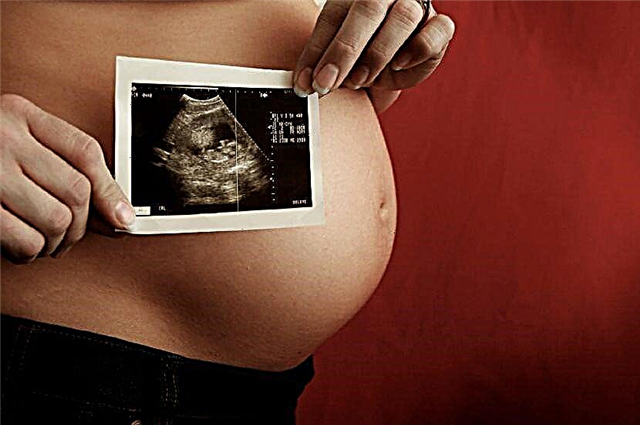It is known that a child who, for whatever reason, was born prematurely, is very different from his peers born at the right time. However, prematurity is not only a lag in growth, weight and development, it is also an underdevelopment of important body systems, as well as a weakness of the immune system. The most important thing for a woman is to carry the pregnancy through. If the baby was born ahead of time, after birth, he must be constantly under the supervision of doctors.

Every woman dreams that her baby is born healthy
Signs of a full-term newborn
Young parents should be well aware of the anatomical and physiological characteristics of a newborn child and the structure of its main organs. In newborns, the head is about 1/3 of the body, therefore visually the impression of a thin, weak body with a disproportionately large head is created. As the child grows, when the child stretches, this impression disappears, the anatomy of the body changes. The following signs of a healthy full-term baby can be distinguished:
- shout;
- pale pink color of the skin, without blue;
- active movements with arms and legs;
- increased muscle tone.
Also, as a sign of maturity and sufficient maturity, a pronounced sucking reflex should be noted, which is most pronounced in the first hours after childbirth. Therefore, many doctors believe that it is necessary to apply a baby to the breast immediately after birth. A quick attachment will help you to easily get the feed going and avoid the allergies that often occur in babies when using formula.

A child born on time screams out loud and loud
Signs of a premature newborn
It is not difficult to calculate a baby who was born ahead of time. The following signs indicate that the baby was born prematurely:
- the skin has a slightly bluish tint;
- muscle tone is significantly reduced;
- the layer of subcutaneous tissue is very thin;
- the baby is low in weight and small in stature compared to healthy children.
Unlike his peer who was born on time, a premature baby reacts poorly to the mother's breast. In severe cases, children do not suck well even artificial milk formula and constantly regurgitate, remaining hungry. It is very important to establish proper feeding, this will help the baby to gain the missing weight faster and catch up in the development of his peers.
Premature babies are often born with congenital neurological conditions that cause drowsiness and lethargy or, conversely, increased anxiety. At the same time, under premature birth, it is customary to mean a baby who has been in the mother's stomach for less than 38 weeks. Pregnancy lasts 40 weeks, babies who were born two weeks before this period are considered full-term in pediatrics.
Attention! The cry of a premature baby is not as loud as that of one born on time. Rather, it resembles a weak mouse squeak. The reasons are insufficient opening of the lungs and their possible underdevelopment.
Digestive system
Premature babies have very few bacteria in their gut that are needed to digest food properly. This leads to unpleasant symptoms and signs of trouble such as:
- intestinal colic that lasts longer than three months;
- profuse regurgitation by a fountain;
- individual intolerance to some components of artificial nutrition;
- frequent diarrhea and constipation.
Also, from the point of view of the development of the digestive system, the apho of the newborn is that the muscles that close the junction of the stomach and esophagus are weak, so children often spit up.
Afos of a newborn baby, if he was born prematurely, consist in the weakness of the sucking reflex and the underdevelopment of the movements necessary for the correct capture and sucking of the breast. Taking a nipple in his mouth, such a baby usually falls asleep immediately. In this case, the baby must be woken up by pulling his nose or cheek. If breastfeeding is not successful, you need to feed the baby with expressed breast milk as an addition to the formula.
To combat intestinal colic and colonize the baby's intestines with beneficial bacteria, it is recommended to choose an artificial milk formula enriched with prebiotics.
To reduce the number of regurgitations, feed the baby often, but little by little, after feeding, keep it upright in your arms for fifteen minutes. Hourly feeding should be avoided. If the baby is breastfeeding, food should be only on demand, then the baby will gradually begin to gain weight. After feeding, you can carry out a control weighing to understand how much milk the baby is sucking.
Cardiovascular and immune systems
Premature babies are often born with an open oval window. This condition is a feature of children's physiology, it is not considered a heart defect and does not require treatment, but in adulthood it can lead to thromboembolism. Also, infants may have defects of the interventricular and interatrial septa, in some cases requiring surgical intervention.
Immune system disorders are manifested as follows:
- frequent diseases of acute respiratory infections in infancy;
- tendency to allergies;
- lethargy, drowsiness, increased fatigue;
- poor weight gain.
This is just a short list, in fact, there are many more such symptoms. To strengthen the child's immunity, it is imperative to temper it; before carrying out any procedures of such a plan, you should consult a pediatrician. Fresh air and life outside the city in the warm season have a beneficial effect on immunity.
Respiratory organs and nervous system

A premature baby differs from peers
Premature babies often have neurological diseases. Most often they are caused by fetal hypoxia during an unfavorable pregnancy or difficult childbirth. The most common symptom of distress is increased intracranial pressure. Underdevelopment of the respiratory system leads to frequent pneumonia. It is better to send such a child to kindergarten after three years in order to avoid permanent respiratory infections.
Bones and skeleton of a newborn
Muscle of a newborn is a smaller percentage of the body than that of an adult. Most of these muscles are found in the abdomen. Also, the anatomical and physiological features of a premature newborn are that he has very fragile bones. If the child is not properly cared for, parents can easily dislocate his arm or leg.

Fragility of bones in a baby is caused by calcium deficiency
AFO of skin and subcutaneous tissue in a newborn baby
Afo skin of a newborn is that the layer of subcutaneous fat in an infant is thicker than that of an adult. However, in a premature baby, it is rather thin, which interferes with normal thermoregulation. Therefore, the skin of such babies is often cold to the touch and bluish, especially when kept in a cold room, children are very sensitive to sudden changes in temperature.
Dressing a premature baby for a walk should be one layer warmer than other babies. At temperatures less than minus five degrees, it is recommended to stay at home. In extreme heat, you should also not leave the house with the baby so that he does not receive heat or sunstroke.
Attention! A yellowish skin tone may indicate a dangerous increase in bilirubin in the blood. Postpartum jaundice of prematurity can lead to deafness and mental retardation, so it must be treated urgently in a hospital setting.
Experts say that with proper nutrition and care, premature babies quickly catch up with their peers, despite some anatomical and physiological features of development. However, the consequences of premature birth can be manifested for a long time in the form of a weakness of the sucking reflex, drowsiness and lethargy, indigestion and frequent illnesses.



